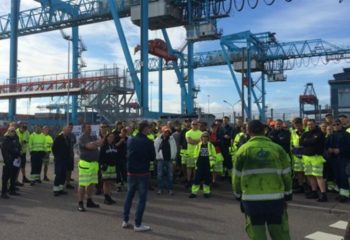
As a drawn-out labor conflict at the Nordic region’s largest port escalates, some of Sweden’s largest exporters are warning they may be forced to find alternative harbors abroad to safeguard shipments.
Container capacity at A.P. Moller-Maersk A/S’ APM Terminals facility in Gothenburg has in the past six months dropped to 80 percent of the normal weekly level of 10,000 containers due to a conflict with the Swedish Dockworkers’ Union. It could drop to 40 percent in the coming days as APM plans a partial lockout in response to the industrial action.
The port handles about half of Sweden’s total container trade, so the stakes are high.
SKF AB, the world’s largest maker of ball bearings, is warning that it may need to permanently relocate shipments to ports in northern Europe if the conflict drags on. Stora Enso Oyj, whose paper, pulp and sawed-wood products account for 10 percent of the terminal’s volumes, is calling on the government to step in to help resolve the conflict.
“The port’s operation is crucial for us to be able to ship our forestry products to global markets in a cost-efficient way,” Stora Enso Chief Executive Officer Karl-Henrik Sundstrom said in a letter to the government.
Having to relocate shipments from the busiest and largest port in Scandinavia could pose a major challenge for an economy such as Sweden’s, where exports represent 44 percent of economic output. Exporters would probably have to send their goods by truck to German ports such as Hamburg and Bremerhaven, Rotterdam in the Netherlands or Antwerp in Belgium. That would add time and drive up costs. Higher Costs
While some goods can be shipped from southern Swedish ports such as Varberg and Helsingborg, they don’t have the capacity to handle any larger volumes.
Theo Kjellberg, a spokesman for Gothenburg-based SKF, said that means the company is considering ports further south in Europe. Still. “that would require longer road transports, which would increase costs for everyone,” he said.
APM Terminals has warned of a partial lockout from May 19 until June 30, in response to blockades imposed by local 4 of the dockworkers’ union, which is seeking to become a party to a collective bargaining agreement that’s signed by the Transport Workers’ Union among other demands. During the lockout, the terminal will offer “only a limited daytime service,” according to APM.
The terminal has had a dialogue with 240 of its customers, and has the understanding of all of these, even as they could now be forced to find alternative solutions next week, according to spokeswoman Annika Hilmersson. Not Talking
“We’re facing a very dramatic escalation of the conflict,” said Erik Helgeson, spokesman of the dockworkers’ local. “The actions the employer is threatening to take are far more wide-reaching than anything we’ve done since last year.”
The union, which organizes 85 percent of workers at the terminal, claims that APM’s management has introduced an anti-union policy and delayed overtime payments.
As for a potential solution?
“It’s not realistic as long as we aren’t even talking to each other,” he said.
The union has rejected several proposals over the past year and its continued action is now having “severe national consequences,” APM Terminals Gothenburg CEO Henrik Kristensen said in an emailed response to questions.
The dockworkers local “has never in the past had a labor agreement and since the union doesn’t want to reach a legal agreement, APM Terminals calls upon the government to intervene,” he said.